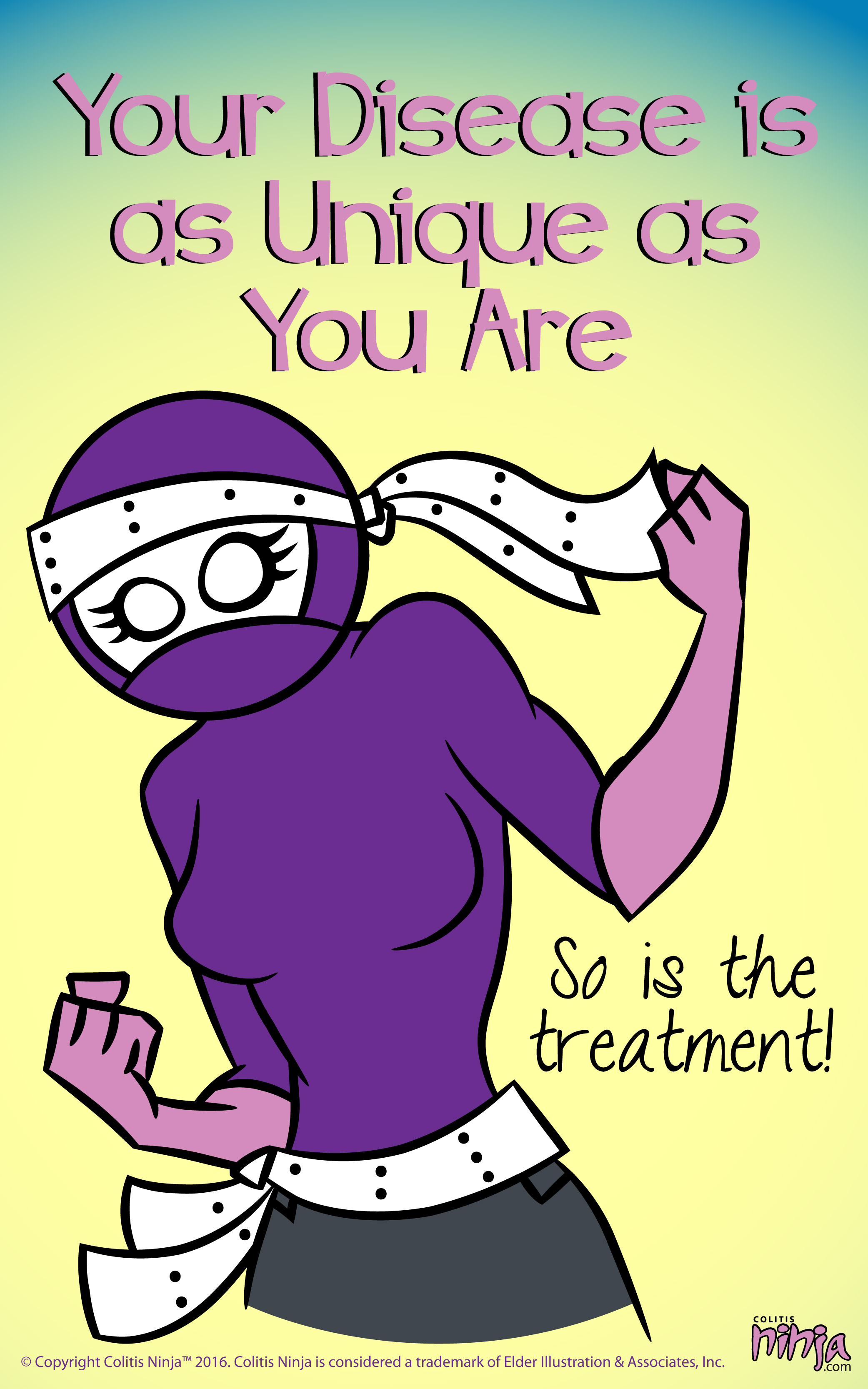Your Disease is as Unique as You Are
For many living with ulcerative colitis, the words “have you tried...?” are some of the most frustrating words you can hear. Many patients have tried so many different methods of symptom management or disease management and asking them if they’ve tried all their options can suggest that we aren’t trying hard enough. It also suggests that the disease is as simple as making a few lifestyle modifications such as following a specific diet or taking a couple of supplements.
Ulcerative colitis treatment is not one-size-fits -ll
 The truth is, it isn’t that simple. UC is extremely difficult to treat. The disease journey is so individual. Many go through trial and error before finding the right treatment. That could take months or even years. Other patients have to have a special “cocktail” of medications and treatments in order to find relief. And even if you find the right one, it doesn’t mean it will keep working for the duration of the disease.
The truth is, it isn’t that simple. UC is extremely difficult to treat. The disease journey is so individual. Many go through trial and error before finding the right treatment. That could take months or even years. Other patients have to have a special “cocktail” of medications and treatments in order to find relief. And even if you find the right one, it doesn’t mean it will keep working for the duration of the disease.
For me, I began with 9 horse pills a day along with Prednisone that I was carefully tapered off of. I was also doing a medicinal enema every night and for a short period of time, I was on antibiotics for a C. Diff infection. But this treatment won’t work for everyone. What works for one patient, will not work for another.
The foods I avoid because of UC
Apart from the medicinal treatment, there are also certain foods that I must avoid if I want to feel my very best. For me, shrimp, bacon, oranges, apple peels, cucumbers, carrots and other uncooked veggies and greens are big no-nos. My safe foods have always been eggs, beef, chicken, fish, ham, potatoes and pasta. Another friend of mine can actually eat leafy greens and veggies, but cannot tolerate meats.
I have seen many miracle diets and supplements touting a cure or relief from symptoms. I have tried many of them. Unfortunately, many of the diets (Paleo, gluten free, ALCAT, etc., etc.) ended up making me feel worse. The supplements did nothing for me. Juicing didn’t help and often made it worse for me, too!
Always talk with the doctor before trying something new
I would never discourage anyone from trying diets and supplements to achieve symptom relief because I know that it has truly helped some people. But if you try anything new, PLEASE consult your doctor. He or she can help monitor everything and make sure you get the best care if things start going south.
My advice on new diets and treatments
- Be careful when you are trying a new diet or supplement. There are a lot of snake oil salesmen out there who are only looking to make a few bucks.
- Find a doctor who is willing to work with you not only in your medicinal treatment, but also dietary. A caring doctor will do his or her best to ensure that you are comfortable with the treatment they suggest. A caring doctor will listen to your concerns and be patient with you as you try to figure out what works best for you. You also want to make sure your doctor is up-to-speed on all the latest IBD treatments. New ones are being developed every year.
- Keep a food diary and start with an elimination diet. This will safely and easily help you track what foods are bothersome and what foods are safe.
- Remember, your disease is unique. No two patient journeys are the same. What works for you may not work for another. And if diet was a success for your friend’s brother’s girlfriend’s cousin, it doesn’t mean it will be for you! The longer you’ve lived with your disease, the easier management becomes.
- Don’t get discouraged if finding the right treatment for you doesn’t happen right away. There is constant research going on for IBD. I actually have a friend with Crohn’s who is currently in school to get his PhD in microbiology. His life-goal is to further research to find a cure. And there are many others like him who live with the disease and are searching for a cure. I tell you this so that you might be encouraged and know that there is a hope in the future. New medicines and safer treatments are being studied, tested and developed every day.

Join the conversation